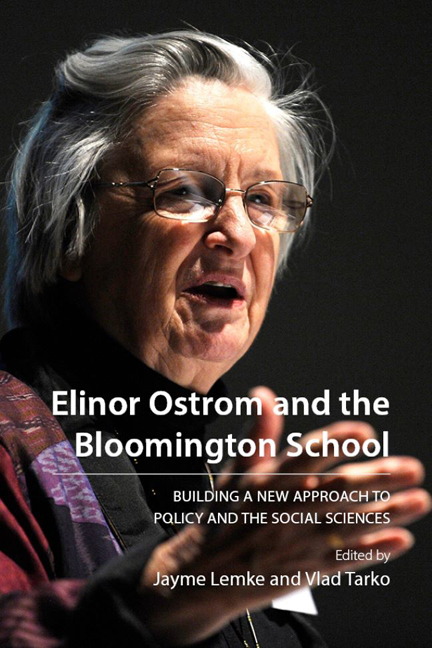Book contents
- Frontmatter
- Contents
- Acknowledgements
- Contributors
- 1 Introduction: the Bloomington school in context
- 2 Public choice theory: reuniting Virginia and Bloomington
- 3 New institutional economics: building from shared foundations
- 4 Elinor Ostrom as behavioral economist
- 5 New economic sociology and the Ostroms: a combined approach
- 6 Foundations of social order: the Ostroms and John Searle
- 7 Environmental policy from a self-governance perspective
- 8 Learning from the socialist calculation debate: is efficiency in public economics possible?
- 9 Public administration from “intellectual crisis” to contemporary “governance theory”
- 10 Rethinking federalism: social order through evolution or design?
- References
- Index
4 - Elinor Ostrom as behavioral economist
Published online by Cambridge University Press: 21 December 2023
- Frontmatter
- Contents
- Acknowledgements
- Contributors
- 1 Introduction: the Bloomington school in context
- 2 Public choice theory: reuniting Virginia and Bloomington
- 3 New institutional economics: building from shared foundations
- 4 Elinor Ostrom as behavioral economist
- 5 New economic sociology and the Ostroms: a combined approach
- 6 Foundations of social order: the Ostroms and John Searle
- 7 Environmental policy from a self-governance perspective
- 8 Learning from the socialist calculation debate: is efficiency in public economics possible?
- 9 Public administration from “intellectual crisis” to contemporary “governance theory”
- 10 Rethinking federalism: social order through evolution or design?
- References
- Index
Summary
Vincent and Elinor Ostrom's work focused on how communities self-organize to solve collective problems. Together with their collaborators, they identified various institutional conditions that make self-governance possible and likely to lead to good outcomes (E. Ostrom 1990, 2005a, 2010a; V. Ostrom 1997; Aligica 2014; Cole & McGinnis 2015a,b; Tarko 2017). Their approach grew out of the public choice revolution, and, as such, is rooted in rational choice theory. However, they have never subscribed to a narrow view of rational choice, building instead on Herbert Simon's idea of “bounded rationality”, i.e. the idea that people are broadly rational, but make decisions subject to imperfect information and time constraints (Grüne-Yanoff, Marchionni & Moscati 2014).
The vast majority of the behavioral economics literature focuses on individual cognitive failures, and the aggregate social issues that may emerge as a result (Ariely 2009; Kahneman 2011). Most of this literature is institutionally shallow, jumping to conclusions from individual cognitive biases to broad conclusions about social-economic consequences. Furthermore, a significant part of this literature has been affected by the replication crisis in psychology (Rizzo & Whitman 2019: ch. 6). For example, much of Kahneman's book, relying on priming effects, has turned out to be mistaken (Chivers 2019). Even effects once considered well-established, like the endowment effect, have recently come under serious doubt, and may reflect the choice of experimental procedures rather than the preferences of the participants (Plott & Zeiler 2005; Isoni et al. 2011, Loomes & Sugden 2011; Zeiler 2011).
In contrast with this, and similar to fellow Nobelists Vernon Smith (2007) and Richard Thaler (1991, 2008), Elinor Ostrom has emphasized not just our cognitive limits, but also the institutions that people create to overcome them. But, while Vernon Smith or Thaler still focus primarily on private choices, and the institutions within which such choices happen, for example, private financial or health choices, Elinor Ostrom has expanded the realm of inquiry by exploring how bounded rationality also enters the picture in collective action problems.
Part of what is at stake here is the recent reframing of paternalism.
- Type
- Chapter
- Information
- Elinor Ostrom and the Bloomington SchoolBuilding a New Approach to Policy and the Social Sciences, pp. 47 - 70Publisher: Agenda PublishingPrint publication year: 2021



